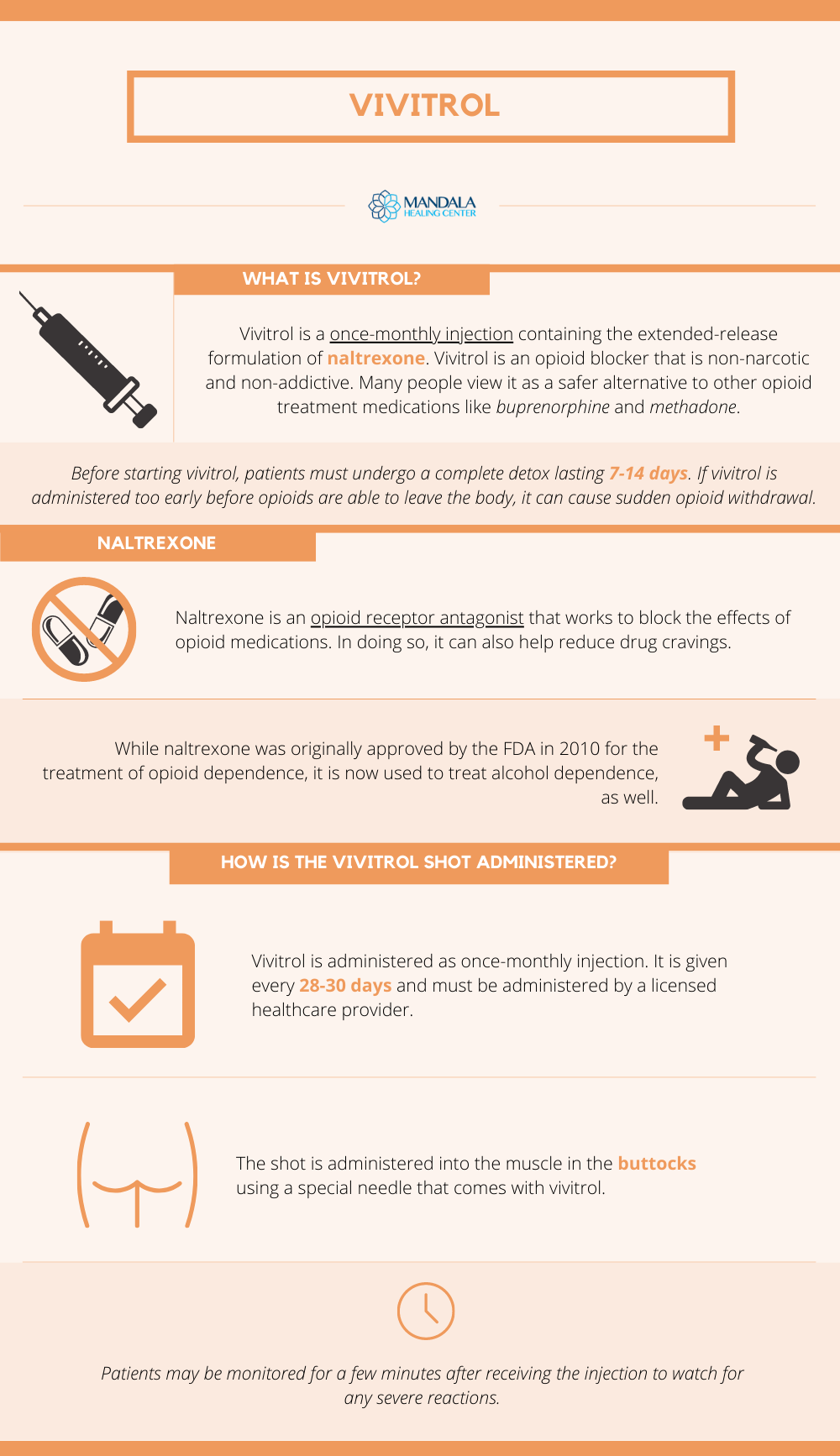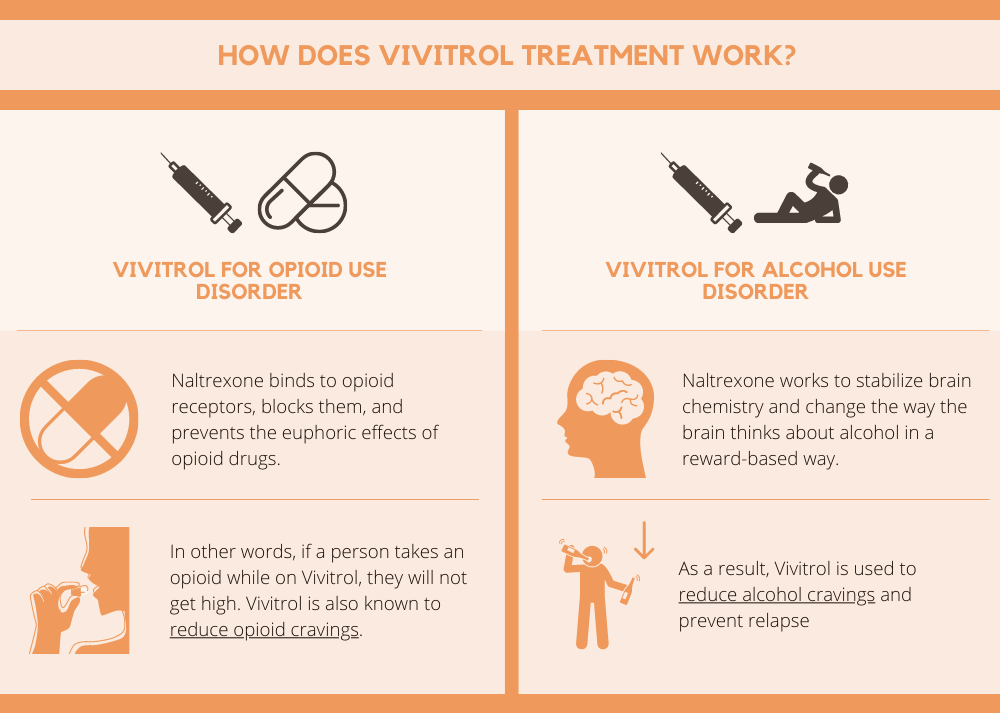Vivitrol is one of many medications that are approved by the United States Food and Drug Administration (FDA) to treat opioid and alcohol use disorders. Like all prescription drugs, however, Vivitrol does not come without risks.
People who struggle with addiction are known for having poor medication adherence. They are at an increased risk of abusing their medication or not taking their medications at all.[1] While Vivitrol seeks to mediate these risks by providing month-long relief in one, professionally administered injection, individuals may still violate their treatment plan by consuming opiate drugs to try and get high.
Unfortunately, taking opiates while on Vivitrol can be dangerous and life-threatening. Instead, the medication should only be used as directed, and patients taking the medication should be actively participating in a solution-focused recovery program.
What is Vivitrol?
Vivitrol is the brand name for a once-monthly injection of naltrexone, a prescription medication that has been used to treat opioid and alcohol use disorders since the late 1980s. Before Vivitrol, naltrexone was only available in a daily pill. However, researchers realized that adherence to oral naltrexone treatment was generally poor, so they decided to develop an extended-release version of naltrexone in the form of an intramuscular injection that is now known as Vivitrol.
Vivitrol was granted full approval by the FDA for the treatment of alcohol dependence in 2006. Later, in 2010, the shot was granted approval for treating opioid dependence, as well.[2]
The Vivitrol shot is injected into the buttocks once a month, releasing a steady dose of naltrexone in the body to reduce cravings and promote recovery. This shot can only be administered by a medical professional in a medical setting and is intended to be used in combination with behavioral therapy, counseling, and peer support.
Vivitrol is known for having very few side effects and drug interactions. The most commonly reported side effects were soreness, itching, and irritation at the injection site–symptoms that are completely normal with an intramuscular injection and that fade away in time. However, individuals may experience adverse side effects if they take opiates while on Vivitrol.[3]
How is Vivitrol Used to Treat Opiate Addiction?
Vivitrol is a highly effective treatment option for opiate addiction because it can reduce drug cravings and increase treatment retention. Naltrexone is an opiate antagonist that works in the brain to block the effects of opioid drugs. It does this by blocking opioid receptors. As a result, if a person uses an opiate while on naltrexone, the opiate will have a limited effect. In other words, Vivitrol makes it difficult to feel the euphoric effects of opioid drugs.
When combined with an individualized treatment program, patients taking Vivitrol may experience a reduced desire to use drugs and alcohol.
Although the medication can reduce opioid cravings, it may not eliminate cravings altogether. Some patients may still experience a desire to use opioids from time to time. Before receiving the injection, patients are informed of the dangers of consuming opiates while taking Vivitrol and are instructed not to do so.
What Happens if You Take Opiates While on Vivitrol?
Vivitrol blocks the effects of opioid drugs, meaning people who take an opiate while on Vivitrol may not feel “high.” Just because a person doesn’t feel high, however, doesn’t mean they haven’t consumed a high dose of opioids. People who consume opiates while on Vivitrol often do so because they want to get high, and when they don’t get high, they consume more and more opiates. This is why taking opioid drugs while on Vivitrol can lead to overdose, coma, and death.[4]
In addition to taking large amounts of opioids to try to get high leading to overdose, Vivitrol can also increase the risk of overdose by making people more sensitive to opioids. This is because Vivitrol helps people get sober, which reduces their tolerance, and decreases the number of opioids their body can handle before experiencing an overdose.
The combination of having a lowered tolerance and trying to consume excess opiates to get high makes combining opiates with Vivitrol extremely dangerous. While Vivitrol can reduce drug cravings and the risk of relapse, it can only accomplish this when it is used correctly.
In summary, Vivitrol may increase the risk of overdose if combined with opiate drugs by:
- Blocking the effects of opioids and encouraging users to try to get high by taking an increased dose
- Reducing the tolerance level of patients who once had a high tolerance for opioid drugs
People who consume opiate medications or drugs such as heroin, oxycodone, or morphine while taking Vivitrol place themselves at high risk for overdose, drug-induced coma, and death.
Find Out of Treatment With Vivitrol is Right For You
The Vivitrol shot is not right for everyone. It’s important to consult with a trusted medical provider before taking Vivitrol. Here at Mandala Healing Center, our addiction specialists can help individuals decide whether or not Vivitrol is right for them.
If you or a loved one are struggling with addiction, our team is here to help. Call now to get started.
References:














